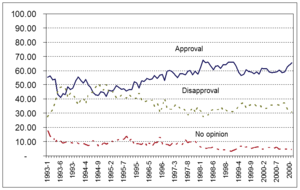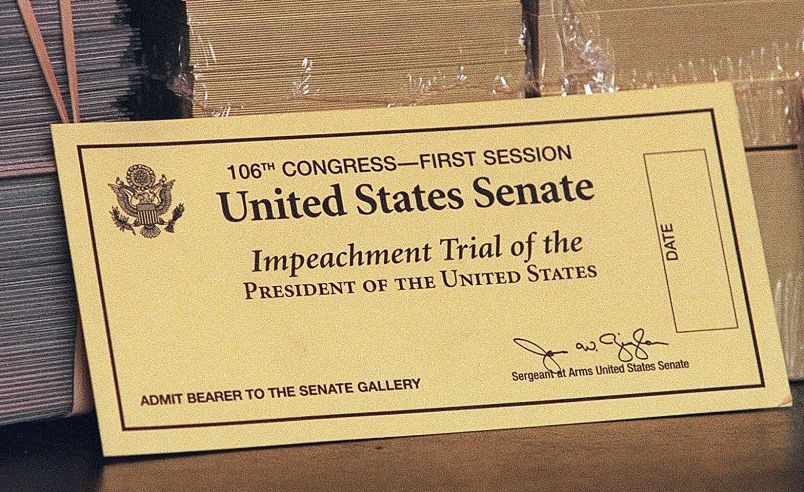President Trump is still angry about the prospect of impeachment. But he’s apparently intrigued with the idea that the battle might actually help boost his approval numbers as it did President Clinton more than 20 years ago. As you know, I think impeaching the President now is unwise, but not because I think or fear that it will boost him politically. We can’t know the future. But the notion that getting impeached will somehow help Trump is mainly based on poor memories or in some cases no memories of just what happened back in 1998. More than poor memories, it’s tied to many people’s inability to grapple with how badly they got the Starr investigation wrong.
Let’s review some history.
First, President Clinton was already quite popular before impeachment even became a serious issue. He hit a nadir of support in the low 40s (where Trump has been through his whole term) just before his first midterm election when Republicans took over both houses of Congress for the first time in more than 40 years. From there it was a fairly steady upward course until the beginning of the Lewinsky scandal in early 1998. When the scandal broke Clinton’s approval number was just under 60% and had been for most of the previous two years. The scandal triggered a spike to near 70% approval which held in that range through the first part of 1998. It spiked again when he was actually impeached. After he was acquitted the number settled back down to around 60% for the rest of his presidency.
Here’s a visual with some of the noise taken out.

And here’s a graphic of the Gallup numbers with more of the bounciness.

Certainly the increasingly robust economy in the second half of the 1990s had a significant effect on Clinton’s popularity. But Trump’s presidency shows clearly that you can have a strong economy and still be super unpopular. The truth is that the economy was long an excuse for elite, post-partisan opinion which was deeply invested in the Whitewater and Lewinsky stories and needed an excuse for why the public never saw it the same way.
The reason for Clinton’s counter-intuitive scandal-based spikes in popularity is based on something most elite national journalists at the time and many others since have been reluctant to grapple with or even state clearly: the scandals themselves were bullshit and a decisive majority public, indeed all but partisan Republicans, saw them as such.
The scandal over the Whitewater land deal ended up being based on nothing. The Lewinsky drama was an effort to concoct legal wrongdoing out of a personal scandal because the Whitewater story simply hadn’t produced anything. That portion of the drama itself grew out of longrunning collusion between the OIC investigators and Jones’ personal attorneys. Republicans were desperate to impeach Clinton because they’d spent years feeding themselves conspiracy theories about his and his wife’s arch-criminality – assorted murders of political enemies, pay-offs, campaigns funded by foreign communists, it was truly endless.
The Starr investigation was a real life example of what Trump and his toadies’ have claimed about the Mueller investigation: a deeply partisan Independent Counsel investigating a Democratic president who staffed his office with young partisan Republican attorneys and spent years with an ever expanding investigation into topics far afield from its original brief. The whole operation also leaked like a sieve. Critically, the whole probe was itself a genuine do-over. The original Whitewater Independent Counsel investigation was run by a career Republican but generally apolitical prosecutor named Robert Fiske. He was finishing up his probe when the re-passage of the Independent Counsel law allowed a group of Republican judges to boot Fiske and replace him with Starr. Clinton never used the words ’17 angry Republicans’ but it would have been a pretty accurate characterization if he had.
What led to Clinton’s impeachment was the interplay between the Paula Jones sexual harassment lawsuit and the Starr investigation, which allowed Jones’ lawyers to depose Clinton about his relationship with Lewinsky. Clearly Clinton tried to conceal his sexual encounters with Lewinsky. But if you look at the articles of impeachment drawn up against him – for lying to a grand jury and obstruction of justice – they are quite weak in legal terms. Comparing them to the extreme special pleading surrounding President Trump’s actions, even from many of his critics, is illuminating. The entire drama was an effort to construct a crime around a personal transgression.
Some people see the substance of Clinton’s actions differently than people did twenty years ago. It was clear at the time that Clinton’s assignations with Lewinsky represented an almost mind-boggling degree of personal recklessness, especially for a President who knew he had partisan enemies who were hunting for anything to be used against him. But my point here isn’t judging Clinton as a person. It’s understanding the interplay between the scandals, impeachment and his popularity and approval as President. Clinton didn’t get more popular because the public doesn’t like impeachments. He got more popular because the Starr investigation and the impeachment inquiry it spawned were pretty transparent efforts to concoct crimes where they didn’t exist and the Independent Counsel’s office was a transparently partisan operation.
Substantive realities matter a lot more here than procedural parallels. But that requires making substantive determinations which most credentialed observers were and are reluctant to do.
Now, is there hard evidence for the difference I’m suggesting other than this judgment about the substantive differences between the two cases? We can’t know to a certainty what the future is without having it happen. But there actually is some highly suggestive public opinion data. The most obvious is that President Clinton began pretty quickly pivoting back to popularity by letting the Republican Congress do its thing starting in January 1995. We’ve also seen that new revelations of President Trump’s criminality and wrongdoing actually do impact his public support. They never push it down below his hard base of support in the high thirties. But they almost always show up by pushing down his approval numbers. Indeed, President Trump’s inability to get out of low 40s support for his entire presidency, despite no wars and a heady economy points pretty clearly to public disapproval of his actions as President as suspicions of his wrongdoing in office and during his presidential campaign.
None of this means the public wants to see the President impeached or removed from office. Polls show pretty clearly that that remains a minority position, albeit a very large and perhaps growing minority. But the reason the scandal itself and later impeachment buoyed Clinton’s approval was because a decisive majority of the public saw the scandals and charges as thoroughly political and either baseless or tied to his personal conduct rather than his conduct as President.
My own resistance to impeaching the President isn’t based on any belief it will make him more popular. I think it’s a mistake it because I’m close to certain it won’t lead to his removal from office (which I think is the only real reason for doing it) and because I think it will shift the public focus from things that will make him or keep him unpopular (his crimes and misconduct in office) to territory where the public is much more divided (whether for the first time in our history a President should be removed from office by the Congress). Both politically and substantively I think it makes more sense to focus on uncovering new wrongdoing than get into a constitutional question where the public is divided and uncertain. But that’s just my own take. The idea that impeaching a President makes him more popular is based on a lot of people just not admitting what happened in the 90s and the fact that a lot of them got taken in by Starr’s and his GOP accomplices’ scams.






